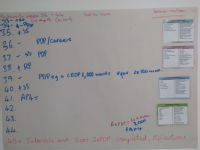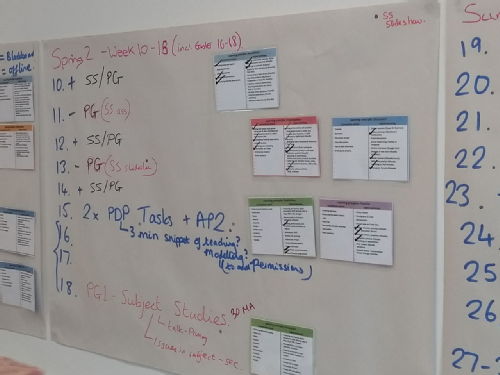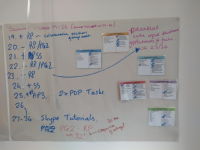Academic Technology news and updates
This page contains updates about new technologies or developments in current technologies and information about TEL events that you might find useful.
Running ABC workshops
In March 2018 I attended a JISC workshop on data-informed blended learning design and was introduced to the ABC Model of Curriculum Development by Natasa Perovic and Clive Young from UCL. The event was timely for me as I was wrestling with how to effect transformative change on established face-to-face programmes with respect to Technology Enhanced Learning (TEL) as opposed to reactive and incremental change which seemed the increasing norm.
The workshop demonstrated how a facilitator could encourage participants to evaluate their current teaching practice and through making relatively simple changes, develop a more blended approach supported by the appropriate use of technology. I was conscious that I did not want to tell staff that they needed to make changes; instead I wanted the recognition of the need for change to come from them; for them to take ownership of the change process.
In June 2018 I was asked to run a curriculum development session on a planning day for the team developing our online PGCE International programme (PGCEi). The original plan was for me to have a 90 minute slot (the same length of time as the original JISC ABC workshop) and to facilitate participants through the process of identifying how the current PGCE was delivered and what they might want to reuse, repurpose or develop afresh for the new PGCEi.
What quickly became apparent was that the original time slot was simply too short; we ended up working on this for four hours. We developed a comprehensive timeline for the programme (see Figure one below) which helped to frame our discussions. We then went through the teaching activities the team had provisionally identified and mapped them onto the different learning types using Laurillard’s Conversational Framework. This showed clear clusters of learning type (e.g. acquisition) which enabled staff to discuss how they might adapt their teaching activities to use some of the less well-used learning types (e.g. investigation).
Figure one
At no point did I suggest that an over-reliance on one particular learning type was poor academic practice or that staff should reduce the amount of acquisition they used with the students. The staff came to this conclusion themselves. The visual nature of the storyboard activity worked really well and made it easy for staff to see the impact of their changes. Each of the learning activities was explicitly related to the assessment points to ensure relevance for the students. When these were spread over the length of the programme it became clear where potential stress points might be and how we could mitigate them by adjusting the learning type (where appropriate) or by reducing the learning activities generally to gain more of an even flow across the programme.
We have subsequently met to discuss specific learning activities in more detail and each time the timelines have been used to frame the discussion. Lessons learned from the workshops include:
- Allow plenty of time for the programme (90 minutes is not really long enough; I would allocate at least half a day)
- Use an appropriate room which gives plenty of space for spreading out and sticking things up on the walls (for a process looking at TEL it is remarkably practical and low-tech!)
- Provide refreshments as this helps the flow of discussion
- Use the ABC icebreaker activities (e.g. creating the Twitter summary); they get staff into the right frame of mind for considering the programme as a whole before getting into the nitty-gritty of the learning activities



